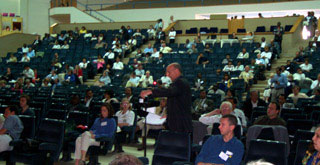 Sustainable Developments
Sustainable Developments |
|
| Daily coverage | Final Briefing | |||||||||||||||||||||||||||||||||||||
|
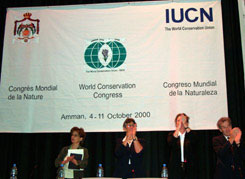 The
Second IUCN World Conservation Congress met from 4-11 October 2000
in Amman, Jordan. An estimated 2,000 individuals from 140 countries
representing governments, NGOs, UN Agencies and the private sector
participated in the Congress. The theme of the Congress was "Ecospace"
- a concept that conveys the message that transboundary management
of ecosystems is vital for the environmental agenda. Over the course
of the meeting, delegates participated in 12 thematic sessions to
consider the issues ranging from: ecospaces and a global culture for
sustainability to environment and security to local solutions promoting
social equity and cultural diversity. The Congress adopted 104 resolutions
on a wide range of conservation, programme and governance topics.
The Earth Forum, a day long meeting co-hosted by the Earth Council
and IUCN, preceeded the Congress and brought together experts to debate
"Where are we going? Prospects for the earth in the new millennium."
Continued in SD's Summary Edition. The
Second IUCN World Conservation Congress met from 4-11 October 2000
in Amman, Jordan. An estimated 2,000 individuals from 140 countries
representing governments, NGOs, UN Agencies and the private sector
participated in the Congress. The theme of the Congress was "Ecospace"
- a concept that conveys the message that transboundary management
of ecosystems is vital for the environmental agenda. Over the course
of the meeting, delegates participated in 12 thematic sessions to
consider the issues ranging from: ecospaces and a global culture for
sustainability to environment and security to local solutions promoting
social equity and cultural diversity. The Congress adopted 104 resolutions
on a wide range of conservation, programme and governance topics.
The Earth Forum, a day long meeting co-hosted by the Earth Council
and IUCN, preceeded the Congress and brought together experts to debate
"Where are we going? Prospects for the earth in the new millennium."
Continued in SD's Summary Edition.
|
|||||||||||||||||||||||||||||||||||||
|
|
|
| 26th SITTINGS OF THE CONGRESS | |
|
|
|
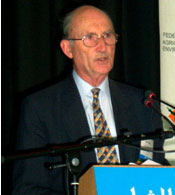
Martin Holdgate presented and discussed the Report of the Programme Committee (CGR/1/1000/CRP.006). He noted that Rule of Procedure no.51, which attempts to limit overlapping mandates, has only been met with partial success. He suggested that in the future, each Commission mandate should be complemented by a strategic plan that fits within the overall IUCN Programme; and that cooperation among the Commissions, and between the Commissions and the Secretariat, could be improved. At the next WCC, Holdgate suggested that one or more of the days allocated for interactive sessions should be dedicated to the KRAs and their cross-cutting nature. |
|
|
Closing Ceremony |
|
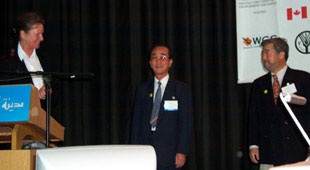 |
Koch-Weser noted that representatives from North Korea had attended the Congress for the first time, remarking that this provided an opportunity to celebrate environment and peace. |
| In the spirit of the new relations between the two Koreas, a South Korean (center) provided translation for the North Korean (left) as he expressed his thanks to the Congress. |
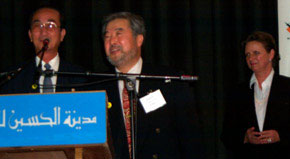
|
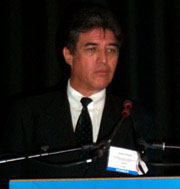 |
The representative of Guatemala announced his country's offer to host the 3rd World Conservation Congress, and presented a brief video on Guatemala. |
|
|
|
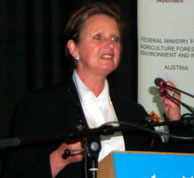
|
Maritta Koch-Weser,
IUCN Director General, expressed her sincere gratitude to the members
of the royal family of Jordan who had supported IUCN. She noted that
Queen Rania would act as patron to IUCN's Global Youth Forum, underscored
the importance of the seven key results areas and encouraged participants
approach Rio +10 with a strong mandate to stop species extinction.
|
|
On behalf of all commissioners, Adrian Phillips noted the clear
message sent by the Congress to integrate the work between Commissions
and to synthesize more effectively with the rest of IUCN. |
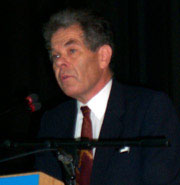
|
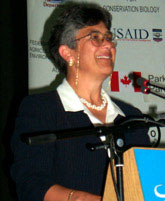
|
Yolanda Kakabadse,
President of IUCN, closed the congress by highlighting IUCN's steps
to decentralize and increase regional representation and stressing
the importance of the new programme which would help ensure accountability.
|
| The Congress adjourned at 12:00pm. |
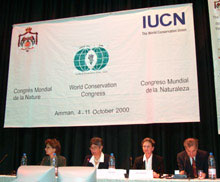
|
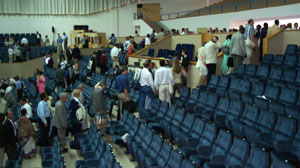 |
After adopting or withdrawing all outstanding resolutions and hearing closing statements, participants left the Plenary Hall of Amman's Sports City for the last time shortly after noon. |
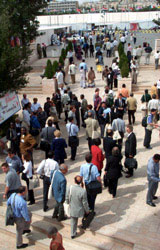
|
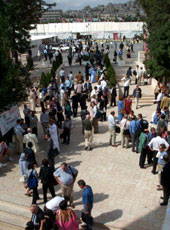
"See you in Guatemala City!" |
|
Behind the scenes |
|
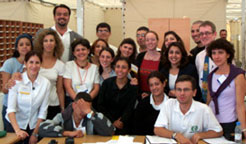 |
The success of the Second World Congress would not have been possible without the hard work of the volunteers, Secretariat staff, interpreters, security and local staff. Pictured here: the helpful people from the Registration desk. |
|
The SD writing team, from left to right: Violette Lacloche (France), Leanne Burney (Canada), Laura Ivers (US), and Alison Ormsby (US). Missing: Fida Hadjeer (Jordan), Logistics Coordinator. Behind the camera: Andrei Henry (Canada), webmaster. |
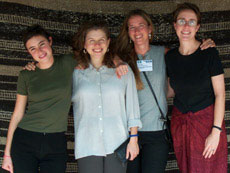 |
|
|
|
|
|
|
|
|

